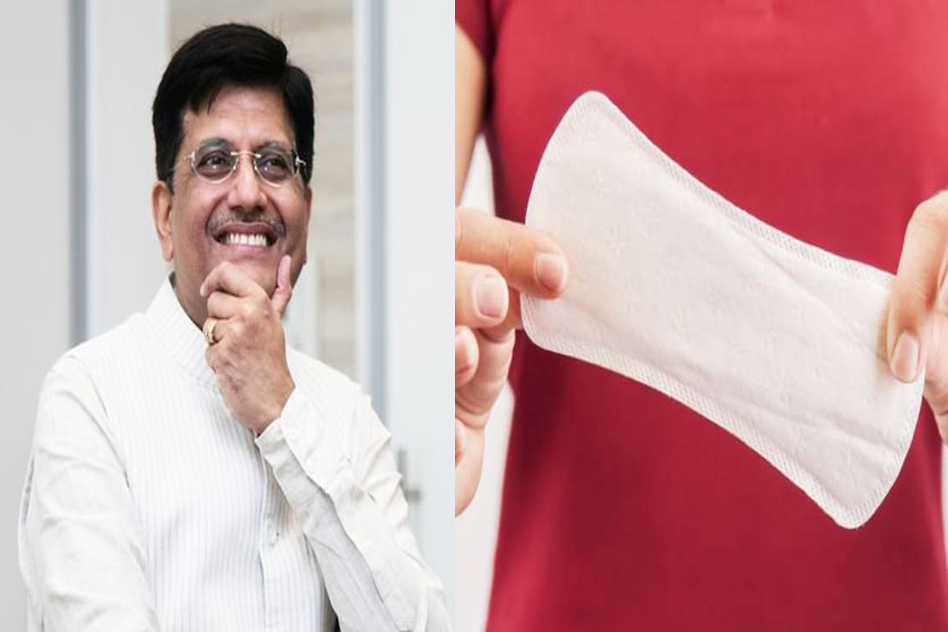
GST Council Meet: Government Cuts GST Rate On 88 Items, Makes Sanitary Napkins Tax-Free
22 July 2018 1:12 PM GMT
Editor : Ankit Sharma Sharma
Green tea Addict | A Tree Hugger | Born for Change
Sanitary napkins have been exempted from GST, Maharashtra Finance Minister Sudhir Mungantiwar said on Saturday after a meeting of the GST Council. Earlier, sanitary napkins were taxed at 12% which had attracted a lot of criticism. Tax exemptions mean there would be no input tax credit available, even though inputs in the production of sanitary napkins are taxed. There had been a widespread demand for making sanitary napkins tax-free.
“Today’s decisions of the GST Council were guided by simplification, rationalisation… Every state wanted that the rates on these items be lowered for the benefit of middle-income households… It has also been decided that the GST Council will rise above revenue consideration and focus more on job creation and economic growth,” said Finance Minister Piyush Goyal, as reported by The Indian Express. It was the first time that Piyush Goel chaired the meeting of the GST Council. He was given the additional charge of the Finance Ministry after Arun Jaitley was admitted to AIIMS for a kidney transplant.
New tax rates to be implemented from July 27
The Goods and Services Tax (GST) Council held its 28th meeting on July 21 and approved rate reductions for 88 consumer-centric items such as cosmetics, refrigerators, washing machines, and small screen televisions, sanitary napkins etc
“I am sure all mothers and sisters will be very happy to hear that sanitary pads are now 100 per cent exempt from tax,” Finance Minister Piyush Goyal told reporters at a news conference in New Delhi, as reported by NDTV.
The GST rate cut will come into effect from July 27. It is estimated to cause a revenue loss of around Rs 8,000-10,000, crore with cuts in the peak 28% slab alone costing the exchequer about Rs 6,000 crore.
In July 2017, citing the high tax rates of 18% and 12% on the inputs, the government had defended the decision to not lower the GST rate of 12% on sanitary napkins. The government release had also said that “reducing the GST rate on sanitary napkins to nil will… result in complete denial of ITC to domestic manufacturers of sanitary napkins and zero rating imports. This will make domestically manufactured sanitary napkins at a huge disadvantage vis-à-vis imports, which will be zero-rated.”
Exemption may not lead to lower prices
Tax experts welcomed the move but pointed out that the tax exemption for sanitary napkins may not lead to lower prices as manufacturers won’t be able to claim input tax credit. As per the calculations, the input tax credit on sanitary napkins is about 3-4 per cent. Goyal said that the government would ensure a lower price for the end product.
Lack of access to sanitary pads
By making sanitary napkins tax-free, the government has removed one of the biggest barriers to education for girls. They are often forced to stay at home due to a lack of access to clean hygiene products, while also facing stigma. Four out of five women and girls are estimated to have no access to sanitary pads.
According to a 2011 study by AC Nielsen, only 12 per cent of India’s 335 million adult women can afford sanitary pads.
Demand for the exemption
Last year, the decision to tax sanitary napkins at 12 per cent had triggered protests, petitions and court cases that questioned why pads were being taxed like a luxury item when condoms were made tax-free. A Meerut based NGO had sent a packet of the sanitary to Prime Minister Narendra Modi protesting against the 12 per cent tax levied on the product, as reported by The Times of India.
“A majority of the women in India are unable to afford sanitary napkins because of the cost. This is when it is a necessity for them and concerns both sanitation and menstrual health of a woman. By imposing 12% GST on sanitary napkins, the government has tried to make a mockery of women,” said Pooja Singh, Secretary of the NGO.
As per NDTV reports, lawmaker Sushmita Dev had launched a petition to demand a reduction or total removal of taxes on pads, citing that about 70 per cent of women in the country could not afford them. The online petition was signed by more than 400,000 people. According to The Times of India, students of a Girls’ college in Bengaluru took out a rally holding placards saying “Don’t tax my period”. They demanded the withdrawal of the 12 per cent GST on the pads.
Before GST was implemented, sanitary napkins were taxed up to 14.5 per cent, based on the states. It ranged between 12 per cent and 14.5 per cent.
New GST rates
According to Indian Express, The items which have been transferred from the 28 per cent tax bracket to 18 per cent include paint/varnish, refrigerator, washing machine, lithium-ion battery, vacuum cleaner, food grinder/mixer, water heater, hair dryer, TV up to 68 cm.
From 28 per cent to 12 per cent: Fuel cell vehicle (compensation cess to be removed, too)
18 per cent to 12 per cent: Handbag/pouch/purse, wooden painting/photo frame, zip and slide fastener
12 per cent to 5 per cent: Handloom Dari, knitted topi up to Rs 1,000, handmade carpet
Cut to zero: Sanitary napkin, sal leaf, “Phool Jhadu,” rakhi, supply of services by old-age homes
Also published on Medium.
 All section
All section













